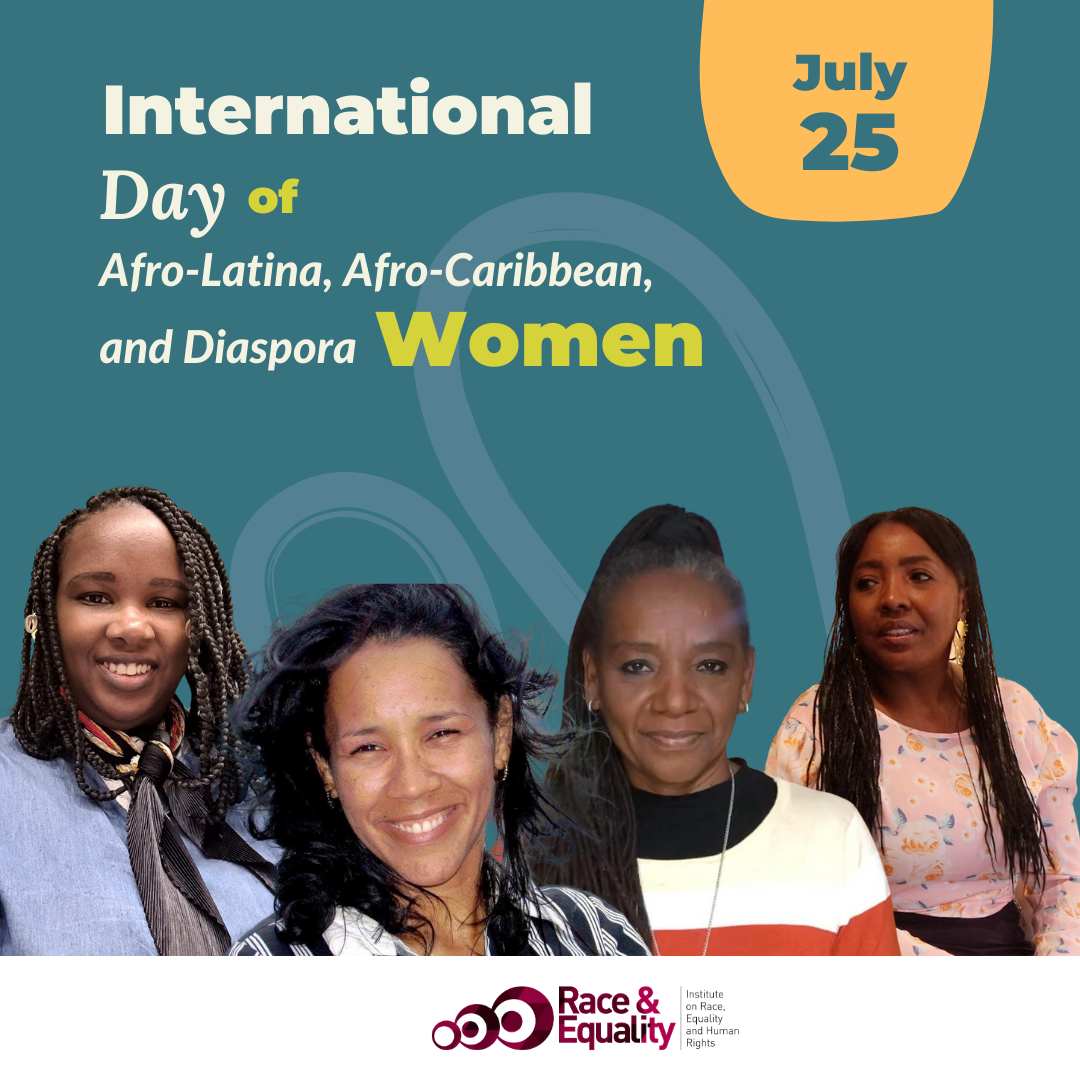25J: Afro-Latina, Afro-Caribbean, and Diaspora Women in Spaces for the Protection and Defense of the Rights of the Afro-descendant Population
Washington D.C., July 25, 2023- The creation of new international mechanisms for the protection and promotion of the rights of people of African descent marks a key and historic opportunity […]

Washington D.C., July 25, 2023- The creation of new international mechanisms for the protection and promotion of the rights of people of African descent marks a key and historic opportunity to overcome the racism and discrimination faced by this population. Therefore, this International Day of Afro-Latina, Afro-Caribbean, and Diaspora Women, from the Institute on Race, Equality and Human Rights (Race and Equality) we call for the gender and intersectional perspectives to be taken into account in these spaces, so that they mark the work of monitoring the situation and making recommendations to the States.
July 25 and the Struggle for Racial Justice
July 25 was established as International Afro-Latina, Afro-Caribbean, and Diaspora Women’s Day during the First Meeting of Afro-Latina, Afro-Caribbean, and Diaspora Women, which was held on a day like today, but in 1992, in Santo Domingo (Dominican Republic), in recognition of the work of women of African descent in the fight against racial discrimination, sexism, poverty, and marginalization.
In our line of work on racial equality, we have been incorporating gender and intersectional approaches in all the actions we carry out (strategic litigation, capacity building, and documentation), as we believe that through these perspectives, we can guarantee the inclusion of women and all those with diverse sexual orientation and gender identity.
Likewise, in view of the creation of international mechanisms on Afro-descendant populations, we have supported the participation of Afro-descendant women in new spaces such as the International Mechanism of Independent Experts to Promote Racial Justice and Equality in the Context of Law Enforcement (EMLER) and the Permanent Forum on People of African Descent (PFPAD), as well as in other long-standing spaces such as the Committee on the Elimination of Racial Discrimination (CERD), and the Committee on the Elimination of Discrimination against Women (CEDAW).
Afro-descendant Women Setting the Agenda in New Mechanisms
At the second session of the United Nations Permanent Forum on People of African Descent, which took place from May 30 to June 2 in New York, Afro-descendant women’s organizations from Brazil, Colombia, and the Dominican Republic formed a Racial Justice Delegation to denounce racial and gender-based violence in Latin America. With the support of Race and Equality and the Black Alliance to End Violence (Fundo Elas), the delegation also raised the need to build agendas and projects to combat, through an intersectional perspective, the different ways in which racist violence affects the lives of women in the region.
“The important thing about being present in this space was that I was able to bring the voices of several silenced women. Grada Kilomba, a black artist, writer, and intellectual says that the white man is at the top of the social pyramid, then comes the white woman, then the black man, and the black woman is invisible at the bottom of the pyramid. And we want to change that,” says Monique Damas, lawyer and Executive Director of Selo Juristas Negras, one of the organizations that made up the delegation.
Erlendy Cuero, Vice-President of the Association of Displaced Afro-Colombians (AFRODES) and who was also part of the Racial Justice Delegation to the United Nations Permanent Forum on Afro-descendants, believes that guaranteeing a gender perspective in these spaces is essential due to the persistence of racist and discriminatory actions aimed at harming their integrity not only because they are women, but also because they are Afro-descendant women.
“We are the ones who suffer the disproportionate impact of the armed conflict, when our bodies continue to be sexually abused as strategies for banishment and uprooting from our territories, when we cannot access education, employment, decent housing, health, etc.,” she says.
Regarding what is expected with the participation of Afro-descendant women in these new mechanisms, as well as in others that have been in operation for several decades such as CERD and the CEDAW Committee, Cecilia Ramirez, Executive Director of the Center for the Development of Peruvian Black Women (CEDEMUNEP), says: “More just, egalitarian, and equitable societies guarantee the autonomy of Afro-descendant women; also, increase the capacities of young Afro-descendant women and provide them with the necessary opportunities to develop their full potential”.
“We hope that our states can generate affirmative actions and public policies with budgets that guarantee the closing of the inequality gaps that we face not only because of our gender condition but also because of our ethnicity,” adds Ramírez. It is worth noting that during the review of the CEDAW Committee in Peru in 2022, Afro-Peruvian activists participated for the first time, through CEDEMUNEP with the support of Race and Equality.
From Cuba, Marthadela Tamayo, from the Citizens’ Committee for Racial Integration (CIR), highlights the gender approach and intersectionality as key tools in spaces on the Afro-descendant population. “Because they are necessary spaces for these populations to explain or narrate the realities they live from all the intersections they go through in their daily lives in their neighborhoods or communities,” she says.
“In addition, these spaces can be very positive scenarios for women to articulate, develop, and participate in the political and public life of a country,” she adds.
Race and Equality will continue to promote the participation of Afro-descendant women in existing regional and international mechanisms for the protection and promotion of the rights of Afro-descendant people. It is essential that the gender and intersectional perspective be taken into account in data collection, situation analysis, and the formulation of recommendations to the States.

